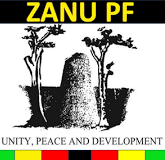
The Forever Associates Zimbabwe (FAZ) trust, set up to help the ruling Zanu PF win the 2023 elections, was established by associates and family members of Asher Walter Tapfumaneyi, the deputy director general of the Central Intelligence Organisation (CIO).
Both Tapfumaneyi and FAZ deny that the CIO controls the trust.
However, this alert provides further details about the past business dealings of Tapfumaneyi and one of FAZ’s trustees that help confirm Zimbabwean media reports about the spy chief’s relationship to the entity.
In particular, FAZ’s official deeds reveal that its trustees and founders include Tapfumaneyi’s family and associates, including Tangisai Tapera, his key ally and business partner in a past oil deal with Iran.
In addition, the main phone number for FAZ was used in the past by a CIO officer, according to a review of several phone apps that reveal the names under which a telephone number has been saved by its contacts in users’ address books, suggesting the involvement of the agency.
FAZ’s activities — including a large get-out-the-vote operation — may have helped the ruling party win the election.
Observers, including the Southern African Development Community and European Union (EU) poll monitors, reported FAZ’s presence at thousands of polling stations, where its reported links to Zanu PF and the security services may have intimidated rural voters.
FAZ also spent at least US$4 million — a large sum of money in Zimbabwean politics — importing 160 or more Toyota Hilux pickup trucks for Zanu PF candidates.
- Letter from America: Is former president Donald Trump a hero or villain?
- Zanu PF shutting down political space
- Parties condemn Afrophobic attacks in SA
- Top CIO boss up for extortion
Keep Reading
FAZ declined to comment when asked whether their activities intimidated voters or whether their spending tipped the electoral scales toward Zanu PF.
FAZ and its founders
Kudakwashe Munsaka, the chair of Faz, says that the entity is the revival of a trust first established by students in 2010 with the support of the Ministry of State for Presidential Affairs (MSPA), a small ministry established during the 2009-2013 coalition period to support the then-president, Zanu PF’s Robert Mugabe.
FAZ was established as a youth empowerment project to access business opportunities.
Munsaka said that when the MSPA was disbanded in 2014, the relationship ended and the trustees abandoned the project — only to revive the entity in 2022.
In May 2023, however, Zimbabwean media outlet The NewsHawks reported that FAZ had been set up by Tapfumaneyi, the CIO’s deputy director general.
While this allegation is denied by all concerned, a trail of breadcrumbs leads to the CIO’s door.
For example, the main phone number for FAZ was once used by one of the CIO’s mid-ranking officers, according to a review of phone contact apps that store users’ address books.
The trust deeds for FAZ, meanwhile, point toward links with one of the spy agency’s current bosses.
Tapfumaneyi’s earlier role at the MSPA, which had helped establish FAZ in 2010, and his longstanding relationship with one of its trustees, Tapera, are central to understanding the connection
Asher Walter Tapfumaneyi
Described by an insider as “the ultimate Zanu patriot,” Tapfumaneyi joined the liberation movement at 16, eventually retiring from the military as a brigadier general.
He served in the CIO as assistant director, then left to take roles leading the MSPA and, later, the war veterans ministry before returning to the CIO as deputy director general in 2020.
During the government of national unity, established after the violence of the 2008 election, the opposition Movement for Democratic Change (MDC) controlled the Ministry of Finance.
To get around their rival’s control of revenue and expenditure, both the military and the CIO set up a variety of joint ventures to raise off-budget funding.
Mugabe established the MSPA, with Tapfumaneyi as principal director, as a way of circumventing MDC influence over the civil service.
The MSPA was designed to carry out various deals away from prying eyes, according to someone in the security sector at the time.37 For example, following the diamond fever that swept through eastern Zimbabwe in the late 2000s, Tapfumaneyi, his second-in-command at the MSPA, Tangisai Tapera set up two companies — Moosejaw Enterprises and Rosy Red Capital.
Later, Tapfumaneyi set up two other companies as part of an MSPA oil deal with Iran.
In 2011, following a meeting with an Iranian oil minister, Tapfumaneyi wrote requesting 90,000 metric tons of fuel, with the contract to be signed by Lionshow Trading in Zimbabwe, whose directors included Tapfumaneyi and Tapera.
Two months later, the two set up Lionshow Resources in the United Arab Emirates: Tapfumaneyi owned 50%, and Mlotshwa and Tapera each owned 25%.
When contacted by The Sentry, Tapera said that he was not at liberty to discuss any details.
FAZ trustees and founders Official records for Faz reveal that Tapfumaneyi is linked to several of the entity’s trustees and founders.
Tapera, Tapfumaneyi’s ally, is a trustee of FAZ.
Another trustee is a family friend who shared an address with a member of Tapfumaneyi’s immediate family.
A third trustee is someone who has the same uncommon name as an official aide to one of the two deputy directors general of the CIO — the position held by Tapfumaneyi — raising the question as to whether they are the same person.
Tapfumaneyi’s son is named as a FAZfounder on its website, while Tafumaneyi’s wife also reportedly headed a local FAZ branch.
When asked about his role with FAZ, Tapera said that he wasn’t at liberty to discuss any details.
FAZ trustees Jesca Saruchera and Lawrence Mhlaba could not be reached for comment.
The presence of several of Tapfumaneyi’s contacts as trustees or founders is indicative of a link, if not between the CIO and FAZ, then at least between Tapfumaneyi and Faz.
Tapfumaneyi has said: “I have nothing to do with Forever Associates Zimbabwe, either personally or officially.”
When contacted by The Sentry, Tapfumaneyi denied any wrongdoing “relating to Zanu PF; nor Forever Associates Zimbabwe and what you allege to be its links to me, which links have absolutely no foundation in law.”
FAZ declined to identify its funders, claiming that it is financed by “well wishers who prefer not to be named.”
Munsaka told The Sentry that FAZ’s “hope and plan, however, is to be 100% self-funded and self-sufficient in the medium to long term once our businesses are fully established, operational and profitable.”
Tapfumaneyi’s ties to FAZ raise the question of whether, rather than being funded by anonymous well-wishers, the Zanu PF affiliate is financed by the state security agency.
Indeed, Tapfumaneyi’s past actions and statements indicate that although he is a civil servant, his loyalties lie with Zanu PF.
While still at the MSPA, for instance, Tapfumaneyi solicited a campaign donation on behalf of Zanu PF, as first jointly reported by the BBC, the Bureau of Investigative Journalism, and the University of Bath.
The joint investigation found that in 2012, he reportedly asked for between $300 000 and $500 000 in exchange for releasing three prisoners charged with illegal surveillance.
The inmates were the directors of a Zimbabwean security company that had been subcontracted by a South African corporate intelligence firm working on behalf of a giant tobacco multinational.
Leaked documents reveal that Tapfumaneyi suggested money would ease the path to their release: “With the upcoming [2013] elections a donation … to Zanu PF would pave the way for negotiations to continue.”
There is no direct evidence that the bribe was actually paid. Tapfumaneyi denies wrongdoing and told journalists he had no knowledge of the events.
The tobacco company said that it maintained the highest standards of corporate conduct.
In 2013, Tapfumaneyi told the Financial Times: “The security apparatus of Zimbabwe is subordinate to the civilian authority.
“As much as it influences opinion within the civilian authority, within Zanu PF, it also follows what Zanu PF will do.”
He continued: “Whatever Zanu PF decides, is what will be done.”







